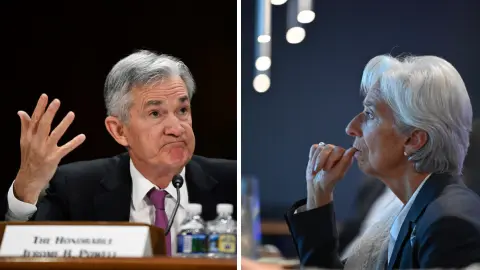ING’s January Monthly: Daring to question the markets’ rate expectations
Financial markets are already pricing in aggressive rate cuts from major central banks by the spring, despite central banks doing all they can to curb at least the timing of rate cut expectations. Call us daredevils, but we think they may have gotten it wrong
Executive summary
Call us daredevils...
The new year started with the global economy’s same old problems: high geopolitical uncertainty, the still-unfolding impact of aggressive monetary tightening, fiscal policy in many jurisdictions gradually becoming more restrictive, and a long list of structural transitions. We're still waiting for any kind of landing for the US economy, just like last year. And we're still watching out for any significant improvement in China and the eurozone. And despite the disinflationary sprint in the second half of 2023, worries are increasing that the inflation genie has still not completely been put back into its bottle.
And there's something else that hasn't changed since December: financial markets are already pricing in aggressive rate cuts by major central banks by the spring despite central banks doing all they can to curb at least the timing of rate cut expectations. In fact, I can barely recall another time when financial market expectations and economists' forecasts of central banks' next steps have been so out of sync.
Of course, we all know the market is always right and that, at all times, it has all the information it can possibly want and need. So, should we really question markets’ rate cut pricing?
I think we should. Call us crazy daredevils, but we are going to challenge current market pricing as we think those central banks will start cutting rates later and more gradually than many expect.
Central bankers are only human...
Why? First of all, the irony of market pricing right now is that it makes the need for actual policy rate cuts less urgent. Financing conditions have eased in both the US and the eurozone since early December, doing the work actual rate cuts should do: supporting growth but also pushing up inflation risks. Consequently, the more aggressive the market prices future rate cuts, the less needed those cuts will be.
Secondly, the very tentative signs of the US economy coming into land, along with the 'at-least-things-are-not-getting-any-worse-in-the-eurozone' scenario, give very little reason for emergency rate cuts. In other words, to get both the Federal Reserve and the European Central Bank to start cutting in the spring, we would have to see a severe economic accident or collapse of the economy, and that's not in our scenarios, nor is it a part of central bank thinking.
Thirdly, there is the inflation story. 2023 was all about base effects and disinflation. 2024 will first have to prove whether it will be the year of more disinflationary momentum or possibly even deflationary pressures or whether we could see some kind of inflation reacceleration. Wage pressure or fiscal policies, as well as new supply chain frictions - for example as a result of the Suez Canal disruptions - are not so unlikely risk factors.
This brings me to the fourth argument, why central bankers will be more hesitant to start cutting rates than markets are currently expecting. It’s the Arthur Burns argument. No central banker wants to be another Arthur Burns, the Fed chairman in the 1970s who is often said to have cut interest rates prematurely, preparing the ground for a second inflation leg. Or, to put it differently, central bankers missed the inflation upswing; they now want to be fully sure of the inflation downswing and will, therefore, by definition be staying well behind the curve.
Maybe this is what entirely rational markets are currently underestimating: central bankers are only human.
Carsten Brzeski
Download
Download report
11 January 2024
ING Monthly: Daring to question the markets’ rate expectations This bundle contains {bundle_entries}{/bundle_entries} articlesThis publication has been prepared by ING solely for information purposes irrespective of a particular user's means, financial situation or investment objectives. The information does not constitute investment recommendation, and nor is it investment, legal or tax advice or an offer or solicitation to purchase or sell any financial instrument. Read more
